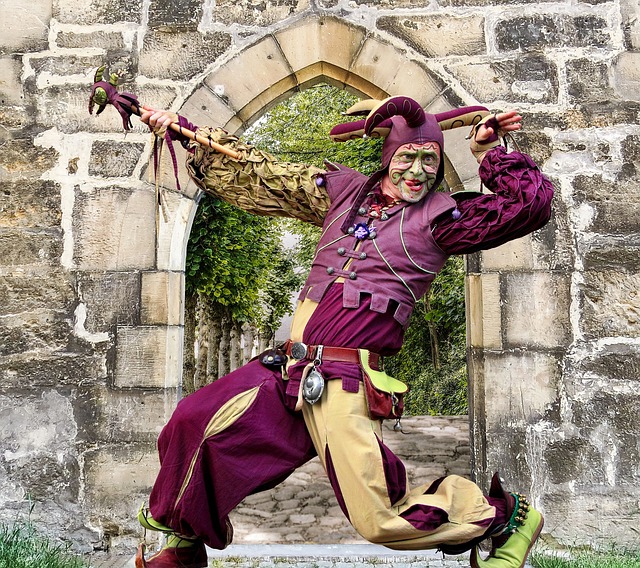
When you think of a medieval jester, what do you picture? A brightly dressed clown with bells on his hat, cracking jokes in front of the king’s fireplace? That’s not entirely wrong, but the truth is more complex. Court jesters weren’t just about slapstick humour. They walked a fine line between comedy and counsel, ridicule and respect.
So, were jesters respected in medieval times? Let’s get into it.
The Jester’s Special Role in Court
Life at a medieval court was deadly serious. Kings, queens and nobles were surrounded by politics, ceremony and power struggles. Into this environment came the jester: loud, witty, colourful and impossible to ignore.
In medieval jester history, their job was to entertain, but their skills went way beyond clowning. They told stories, played instruments, sang songs, did acrobatics and delivered sharp jokes that cut through the tension. They were a variety of performers who could adapt their act to the audience.
But what set them apart was the rare privilege of speaking freely. Jesters were the only people at court who could tease or criticise a king without fear of execution, so long as it was done with humour. Their words might be wrapped in laughter, but the truths underneath were very serious indeed.
Were Jesters Really Respected?

Respect for jesters wasn’t automatic. Some were dismissed as fools in funny costumes, mocked more than admired. But others managed to carve out a position of real respect and trust within the royal household.
Take Will Sommers, the favourite jester of King Henry VIII. Henry was famous for his temper, yet Sommers was allowed to speak freely to him. He was a constant presence, even at private family moments, and remained in royal service long after Henry’s death. That kind of loyalty and closeness suggests a man was respected, not just tolerated.In France, Triboulet, jester to King Francis I, was equally famous. Sharp-tongued and fearless, he would regularly take the mickey out of courtiers and even the king himself. When sentenced to death for an insult, Francis gave him the chance to choose how he would die. Triboulet’s witty reply, that he wished to die of old age, was so good it saved his life. It’s hard not to admire that kind of quick thinking.
Stories like these show that not every jester was respected, but the best ones certainly were. They were valued for their humour, intelligence and ability to lighten the heavy atmosphere of court life.
Humour as a Tool of Power
It sounds strange to say a fool could have power, but humour was a kind of weapon in the medieval court.
Imagine a heated debate between nobles. The tension is high, no one dares challenge the king and the mood is thick with fear. Then the jester steps forward and delivers a joke that makes everyone laugh but also makes a serious point. Suddenly the king rethinks his position or the room relaxes enough to find a compromise.
That’s the subtle influence of the fool: using humour to guide, to challenge and sometimes even to protect. Their status may have been low in the social order but their voice carried weight in the right moment.
Jesters Beyond the King’s Court
Not every jester lived in a palace. Many travelled with noble families or performed in town squares, fairs and taverns. These “wandering jesters” or minstrels were more like street performers, earning their living by entertaining ordinary people.
At public festivals, jesters were often the centre of the fun. They juggled, danced, mocked the powerful and gave voice to the frustrations of everyday folk. In this way they were cultural mirrors, reflecting both the humour and hardships of medieval life.
There were also female jesters, though they were rare. Known as “jestresses” or “fools,” some served queens or noblewomen, entertaining their households. Their presence reminds us that humour and performance weren’t exclusively male professions.
The Risks of Being a Fool
Of course, being a jester wasn’t always funny. Their position was precarious and one misjudged joke could be disastrous.Their colourful costumes, striped tunics, motley patterns and hats with bells were designed to make them stand out. While that gave them licence to speak freely, it also branded them as outsiders. Many courtiers looked down on them as lowly entertainers, beneath the dignity of nobility.
And while a good joke could save a jester’s life, a bad joke could lose them their job or worse. Jesters lived at the mercy of their patrons, their survival dependent on keeping powerful people amused.
How Jesters Were Seen by Society
So what did ordinary medieval people think of jesters? Records suggest mixed opinions. To some they were beloved entertainers who brought laughter to a harsh and uncertain world. To others they were foolish clowns, unworthy of respect.
But here’s the interesting bit: many jesters left enough of a mark that they were remembered long after they died. That in itself suggests society valued them, at least in part, for their wit and bravery.
The Jester’s Legacy
So, were jesters respected in medieval times? The answer isn’t black and white. Some were dismissed and ridiculed, but others earned a place of trust and admiration at the very heart of power. Their courage, intelligence and humour allowed them to do what few others could: speak truth to authority.
Their legacy lives on today. Modern comedians, satirists and political cartoonists all carry a hint of the medieval fool in their work. They say the unsayable, challenge leaders and make us laugh while doing it. Just as a jester once mocked a king, a modern comic might roast a prime minister on live TV.
It seems the fool’s role never really disappeared, it just evolved.

Leave a Reply